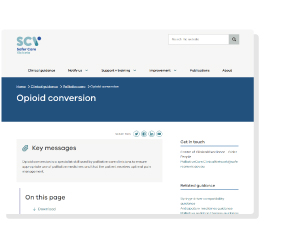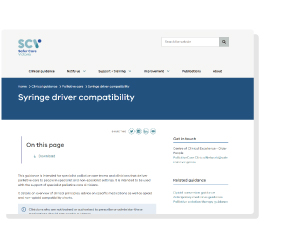The aim of palliative care is to allow patients to be pain free or for their pain to be sufficiently controlled so that it does not interfere with their ability to function or detract from their quality of life.
The use of medication for the treatment of acute pain is the same as for non-palliative care patients. The treatment of chronic pain, that is often poorly managed, requires a different approach to acute pain.
There is a myriad of pain medications available as they treat different types of pain.
Useful Resources

CareSearch - Pain
Evidence-based information and resources on pain assessment and management in palliative care collated by CareSearch.
Visit Website

Opioid Conversion
Opioid conversion is a specialist skill used by palliative care clinicians to ensure appropriate use of palliative medicines and that the patient receives optimal pain management.
Visit Website

Syringe Driver Drug Compatibilities
This guidance is intended for specialist palliative care teams and clinicians that deliver palliative care to people in specialist and non-specialist settings. It is intended to be used with the support of specialist palliative care clinicians.
It details an overview of clinical principles, advice on specific medications as well as opioid and non-opioid compatibility charts.
Clinicians who are not trained or authorised to prescribe or administer these medications should not use this guidance.
Visit Website
Managing breakthrough and episodic pain
This podcast addresses the assessment and treatment of breakthrough and episodic pain and the management of different types of pain.
Dr Peter Martin is Clinical Director of Palliative Care for Barwon Health and Associate Professor at Deakin University.